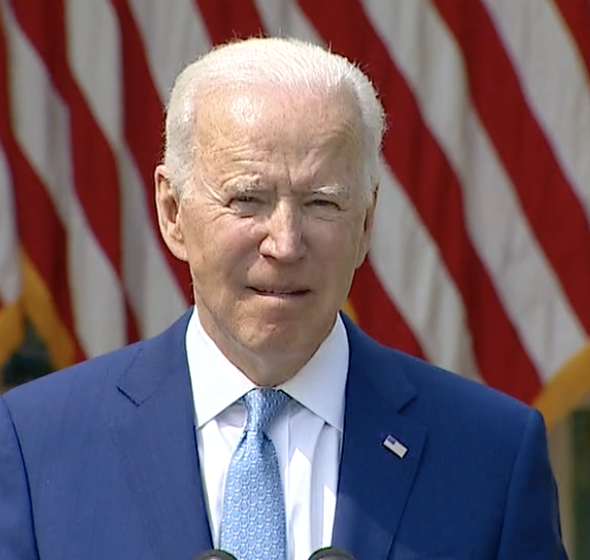POWELL: Biden Assessment–Year One

An assessment of President Joe Biden’s first year clearly shows weakness in issues management. He has allowed more issues to become crises than he solved: Energy, border, urban violence, inflation, supply chain, fentanyl deaths, the aftermath of COVID-19 policies, and Afghanistan.
Biden has two tendencies that contribute to his lack of success in issues management: Failure to get ahead of issues and misreading residual costs associated with his decisions. He was caught short on inflation and has still not acknowledged the residual issues associated with open borders and his energy policy.
Every president has had to manage complex issues and crises while in office. So, how does Biden stack up to some of his predecessors? The issues he has been called on to manage are much less grave in scope than the dual crises, Great Depression and World War II, faced by President Franklin Roosevelt. The decisions he has made are of lesser magnitude than President Harry Truman deciding to drop two atomic bombs on Japanese civilians to end the war.
He has neither demonstrated the political finesse of President Dwight Eisenhower in defusing the Little Rock school desegregation issue in 1957, nor the accountability of President John Kennedy who immediately owned up to the failure of the Bay of Pigs invasion, or President Ronald Reagan who publicly admitted his mistakes after the Tower Commission Report on Iran-Contra.
He has not shown the agility of President Bill Clinton to triangulate after the American people resoundingly rejected his liberal approach to government in his first two years, nor has he shown the humility of President George H.W. Bush in ending the First Persian Gulf War when his stated objectives were reached and a retreating army could easily have been decimated.
The end of his first year shows a president who is following the example of President Lyndon Johnson, who squandered his presidency in pursuit of victory in Vietnam; President Jimmy Carter, whose presidency was paralyzed by the Iran Hostage Crisis, President Richard Nixon, who refused to acknowledge the consequences of Watergate until it was too late to save his presidency; President Gerald Ford, whose pardon of Nixon failed to heal the nation and sunk his presidency; and President George W. Bush, who unilaterally expanded his mandate to wage the War on Terror and lost the support of the American people as a result. Biden during his first year would not abandon “Build Back Better” even though it had no chance of passing in the Senate.
There is ample evidence, based on Biden’s “secret” meeting with historians at the White House in March 2021, to support his desire to be great. The vehicle he has created to accomplish that goal appears to be his “Build Back Better” initiative. The $5 trillion program is transformative and it could be argued that it would set the stage for a post-capitalism economy in America.
The World Economic Forum defined the launch point for the move toward more global governance and “social capitalism” as the COVID-19 pandemic but events, including the invasion of Ukraine by Russia, are overtaking it in importance and causing the Western nations to pause and rethink many of their assumptions about energy and defense of the free world.
Effective crisis management is what elevates presidents to the pantheon of greatness. George Washington invented the presidency because he was the first president and was truly the “indispensable man” of his era. Abraham Lincoln embraced our founding values (rights are God-given and all men are created equal) as the moral foundation for civil war. Franklin Roosevelt asked for and was given a mandate from the American people to take extraordinary measures to tame the Great Depression. Lyndon Johnson embraced the ripeness of the civil rights issue and used his formidable political skills to enact his Great Society agenda. The opportunity for greatness is created in large measure by the times in which a president serves in office. Greatness cannot be achieved simply because a president wants to be great.
Biden was given the mandate to heal our nation’s divisions. Arguably, he has exacerbated them in year one. With razor-thin majorities in Congress, the opposite of FDR in 1933, Biden has tried to push through his own version of the “New Deal.” Lacking broad-based popular support, he desired to enact his own version of the “Great Society.” Biden misread FDR, who assiduously avoided his self-imposed third rail – being defined as a socialist because of his policies. He also did not give enough credit to LBJ, who was a master legislator and the hardest worker in Congress, long before he became president. Their significant accomplishments were not accidents nor were they givens.
There may be unforeseen issues and crises over the next three years that will provide Biden with the opportunity to achieve greatness. But that is not where he finds himself as he begins 2022. At this point, it would be best for him to focus on what he was elected to do – heal our divisions. Then, when opportunities present, he would have a consensus to act boldly.


